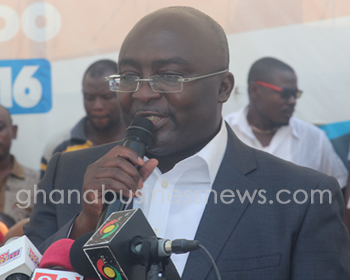Build future beyond aid – Vice-President
 Vice-President Dr Mahamudu Bawumia has urged African countries to consider a future beyond aid as inflows from traditional donors dwindle across the continent.
Vice-President Dr Mahamudu Bawumia has urged African countries to consider a future beyond aid as inflows from traditional donors dwindle across the continent.
Addressing a meeting of G20 Compact countries Finance Ministers in Accra, Dr Bawumia said the fall in aid should spur the countries to build a future with enhanced productive capacity, with a robust private sector, and one where infrastructure gaps are met.
“We must create space for our private sector to thrive and provide the jobs and finance needed to grow our economies. And we must create the environment to mobilize domestic financing,” he said.
The Finance Ministers of the seven Compact Countries are meeting for the first time in Accra to exchange ideas on how best to use the Compact with Africa (CwA) to support their economic development.
The CWA was launched following the June 12-13 G-20 Africa Partnership Conference in Berlin and the G20 Summit of 7-8 July in Hamburg.
It seeks to increase private investment from G20 countries to Africa by improving the macroeconomic, business, and financial frameworks.
Dr Bawumia said there was the need for the African countries to own and drive the implementation of the CwA by being ambitious and bold.
“The Compact with Africa is just that – a Compact. We, African governments, have made commitments. The World Bank, IMF and African Development Bank have made commitments. And the G20 nations have made commitments. It is our responsibility and duty to live up to our commitments,” he said.
“Let us use the Compact to harness our transformational opportunities. Let us harness our capacity to learn from each other and improve,” he added.
Dr Bawumia said for Ghana the CwA had been an opportunity to re-focus attention on areas where investment was badly needed – and where we have created a positive business environment.
This includes areas such as renewable energy, agriculture and agro-processing, the financial sector, infrastructure such as transport, industrial sectors such as aluminium and petrochemicals, and tourism.
He said the pillars of the Compact fell in line with the government overarching goal of building a very business-friendly environment un-parallel in Africa that will create jobs and stimulate growth and wealth creation.
Dr Bawumia said under the macroeconomic framework pillar government was focused on prudent expenditure management to reduce expenditure, broadening the tax base, enhancing tax compliance to reverse the unfavourable debt dynamics.
We are also pursuing domestic debt re-profiling to lengthen maturities and reduce the cost of credit, he said.
Under the business framework pillar, government is creating the Ghana Business e-Registry and developing model contracts in line with international best practice while under the financial framework pillar government was reducing its dominance in the domestic debt market and promoting corporate issuance.
Dr Bawumia said the CwA provided yet another opportunity for the countries to work together and also together with the international partners.
Finance Minister Ken Ofori-Atta said though the CwA was conceived by the Government of Germany, it is really part of Africa countries own broader agenda for economic development on the continent.
He said increasing private sector investment in both infrastructure and production facilities that create jobs and add value to agriculture and natural resources were critical to Africa’s economic development.
“What the CWA offers then is an opportunity and support to re-double our efforts in pursuing our own agendas, and importantly a framework that offers us the opportunity to work together—through peer learning and mutual motivation—so as to accelerate our progress,” Mr Ofori-Atta added.
Finance Ministers from the seven Compact countries Côte d’Ivoire, Ghana, Ethiopia, Morocco, Rwanda, Senegal, and Tunisia are attending the meeting.
There are also representatives from Burkina Faso, Benin, Gambia, Liberia and Guinea.
Source: GNA
